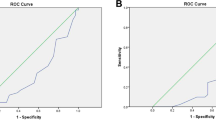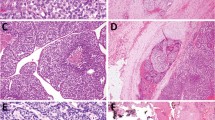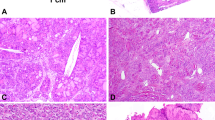Abstract
Eukaryotic cell cycle progression is controlled by a host of cyclin/cyclin-dependent kinases (Cdks), that are themselves regulated by multiple factors, including a group of small cyclin-Cdk inhibitor proteins (p15, p16, p21 and p27). The involvement of Cdk inhibitors in carcinogenesis has been demonstrated by the studies of p16. p53 is frequently mutated in thyroid carcinomas and p21/Waf1 is a downstream effector of p53. It is conceivable that genetic defects of genes downstream in the p53 pathway could also be oncogenic. We, therefore, examined a series of 57 thyroid tumour specimens (eight follicular adenomas and 49 carcinomas) for deletion and point mutation of the p21/Waf1 gene. Three different kinds of deletions ranging from 349 to 450 bp were detected in five papillary carcinoma specimens by reverse transcription-polymerase chain reaction (RT-PCR). All the deletions were involved in the second exon of the p21/Waf1 gene. RT-PCR single strand conformational polymorphism (SSCP) analysis of remaining samples failed to reveal any point mutations in the coding region of the gene, except for a polymorphism at codon 31 (Ser to Arg). Genomic Southern blot analysis did not demonstrate any gene deletion or rearrangement in these samples, indicating abnormal RNA splicing may be involved. Analysis of intron-exon boundary and the coding region of the second exon did not reveal any mutation except for a point mutation (C to G) located 16 bp downstream from the splice donor site of the second intron in three out of five samples with p21/Waf1 deletions. Whether the mutation plays any role in aberrant RNA splicing remains to be determined. Among the five samples with p21/Waf1 gene deletions, none of them simultaneously carried a p53 or retinoblastoma (Rb) gene mutation. No p21/Waf1 abnormality was found in the benign adenomas. Thus, 12.5% (5/40) of thyroid papillary carcinoma specimens harboured p21/Waf1 gene deletions. Our data suggest that p21/Waf1 gene deletion is involved in thyroid carcinogenesis and may play an important role in thyroid cell transformation.
This is a preview of subscription content, access via your institution
Access options
Subscribe to this journal
Receive 24 print issues and online access
$259.00 per year
only $10.79 per issue
Buy this article
- Purchase on Springer Link
- Instant access to full article PDF
Prices may be subject to local taxes which are calculated during checkout
Similar content being viewed by others
Author information
Authors and Affiliations
Rights and permissions
About this article
Cite this article
Shi, Y., Zou, M., Farid, N. et al. Evidence of gene deletion of p21 (WAF1/CIP1), a cyclin-dependent protein kinase inhibitor, in thyroid carcinomas. Br J Cancer 74, 1336–1341 (1996). https://doi.org/10.1038/bjc.1996.546
Issue Date:
DOI: https://doi.org/10.1038/bjc.1996.546
This article is cited by
-
Polymorphisms in the p53 pathway
Oncogene (2006)
-
Pathogenetic mechanisms in thyroid follicular-cell neoplasia
Nature Reviews Cancer (2006)
-
P53 mutations in thyroid carcinoma: Tidings from an old foe
Journal of Endocrinological Investigation (2001)
-
TRAIL-induced apoptosis of thyroid cancer cells: potential for therapeutic intervention
Oncogene (2000)
-
Cell cycle and cancer
Revista de Oncología (2000)



